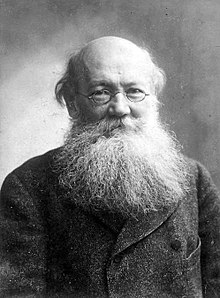
Back Pjotr Kropotkin Afrikaans Pjotr Alexejewitsch Kropotkin ALS Piotr Kropotkin AN بيوتر كروبوتكين Arabic بيوتر كروبوتكين ARZ Piotr Kropotkin AST Pyotr Kropotkin Azerbaijani Кропоткин Пётр Алексеевич Bashkir Пётр Аляксеевіч Крапоткін Byelorussian Пётар Крапоткін BE-X-OLD
Peter Kropotkin | |
|---|---|
| Пётр Кропоткин | |
 Kropotkin c. 1900 | |
| Born | Pyotr Alexeyevich Kropotkin 9 December 1842 |
| Died | 8 February 1921 (aged 78) |
| Resting place | Novodevichy Cemetery, Moscow |
| Education |
|
| Notable work |
|
| Spouse | Sofia Ananyeva-Rabinovich |
| Children | Alexandra |
| Family | Kropotkin |
| Era | |
| Region | |
| School | |
Main interests |
|
Notable ideas |
|
| Military career | |
| Allegiance | |
| Unit | Corps of Pages |
| Commands |
|
| Signature | |
Pyotr Alexeyevich Kropotkin[a] (9 December 1842[b] – 8 February 1921) was a Russian anarchist and geographer known as a proponent of anarchist communism.
Born into an aristocratic land-owning family, Kropotkin attended Page Corps and later served as an officer in Siberia, where he participated in several geological expeditions. He was imprisoned for his activism in 1874 and managed to escape two years later. He spent the next 41 years in exile in Switzerland, France (where he was imprisoned for almost four years) and England. While in exile, he gave lectures and published widely on anarchism and geography.[3] Kropotkin returned to Russia after the Russian Revolution in 1917, but he was disappointed by the Bolshevik state.
Kropotkin was a proponent of a decentralized communist society free from central government and based on voluntary associations of self-governing communities and worker-run enterprises. He wrote many books, pamphlets and articles, the most prominent being The Conquest of Bread (1892) and Fields, Factories, and Workshops (1899), with Mutual Aid: A Factor of Evolution (1902) being his principal scientific offering. He contributed the article on anarchism to the Encyclopædia Britannica Eleventh Edition[4] and left an unfinished work on anarchist ethical philosophy.
- ^ Slatter, John. "Kropotkin, Pyotr Alexeyevich." Archived 16 September 2016 at the Wayback Machine Encyclopedia of Russian History. 2004. Retrieved 1 March 2016 from Encyclopedia.com.
- ^ "Kropotkin" Archived 25 December 2014 at the Wayback Machine. Random House Webster's Unabridged Dictionary.
- ^ Caves, R. W. (2004). Encyclopedia of the City. Routledge. p. 414. ISBN 978-0-415-25225-6.
- ^ Peter Kropotkin entry on 'anarchism' from the Encyclopædia Britannica (eleventh ed.), Internet Archive. Public Domain text.
Cite error: There are <ref group=lower-alpha> tags or {{efn}} templates on this page, but the references will not show without a {{reflist|group=lower-alpha}} template or {{notelist}} template (see the help page).